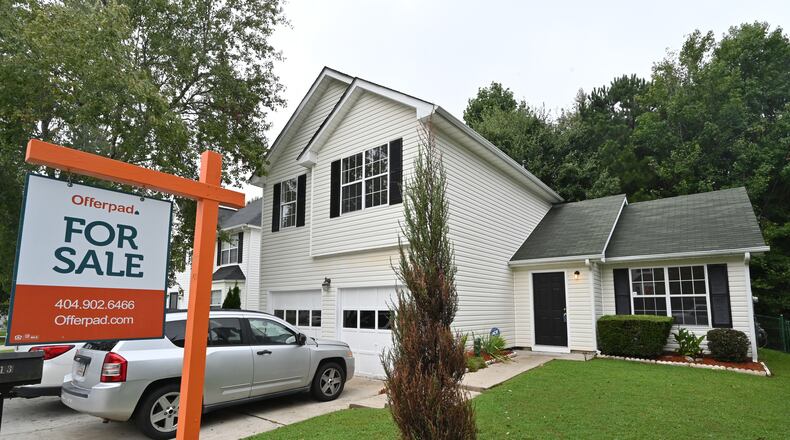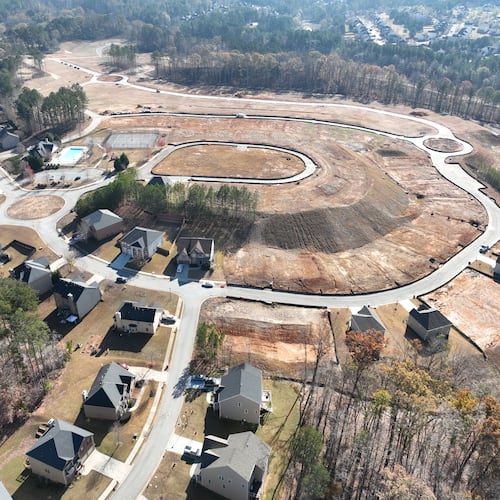Monica Nash, 39, said she had to outbid four other people to land a three-bedroom home in Lithonia.
“I had to pay $10,000 more than the asking price,” she said. “That’s how hard things are. It is very competitive.”
Yet a low mortgage rate means her monthly payment will be less than her previous rent, she said. “It’s a great school district. And I have a young daughter. Everything I do, I do for her.”
Nash found, like many other would-be home-buyers, that the coronavirus has added to imbalances in the metro Atlanta housing market, with home listings in short supply.
The pandemic has made sellers reluctant to put their homes on the market, while historically low interest rates have lured a steady stream of buyers to compete for what’s available.
The results have been bidding wars and higher prices, say brokers.
“Once the (interest) rates went below 3% the first time, it opened the floodgates,” said broker Kristen Jones, the owner of Re/Max Around Atlanta. “You are going to pay top dollar, but you are going to get a ridiculous interest rate.”
In July, buyers purchased more than 10,000 homes in metro Atlanta with a median price of $283,485 – up 9.1% from the same month last year, according to a report from Re/Max. Among the region’s core counties, the highest priced homes were in Forsyth, and the most sales action was in Fulton.
Credit: HYOSUB SHIN / AJC
Credit: HYOSUB SHIN / AJC
Some of the demand might have been catch-up from early spring, when there were few sales. But at least in the near-term, it’s a trend that is likely to continue. Pending sales — contracts for sale that will usually end in a closing — were 14.6% higher last month than in July 2019.
The strong demand for homes seems to defy the economic news.
Georgia, like the nation, has been wracked with a painful, pandemic-triggered recession. Business shutdowns and changes in consumer spending eliminated jobs, sending the unemployment rate into double-digits.
More than 1.3 million Georgians have made valid unemployment claims since early March.
And there are signs that the turmoil has hurt some homeowners. Of nearly 1.4 million mortgage loans in Georgia, payments on 9.74% were past due — nearly half of them at least 90 days behind, according to the most recent data from the Mortgage Bankers Association.
But the lion’s share of the job losses have been in blue-collar positions, people who are typically renters, not homeowners.
And for white collar workers who did not lose paychecks, there are ample enticements to buy a home, especially the historically low mortgage rates. The most recent average rate for a 30-year mortgage in the United States is 2.99%, which is the lowest in at least a half-century, according to the St. Louis Federal Reserve Bank. But sellers are scarce.
Last month’s inventory — the number of homes listed for sale — was equal to about 1.8 months of sales, according to Re/Max. Experts say that in a balanced market, in which buyers and sellers have roughly equal negotiating sway, inventory should be equal to six months or more of sales.
Credit: HYOSUB SHIN / AJC
Credit: HYOSUB SHIN / AJC
The number of listings in July was 42% below a year ago.
For several years, the Atlanta market has been tilted to the advantage of sellers, although listings had begun to rise last winter. Then came the pandemic, which made many homeowners, especially older ones, reluctant to sell, said Daryl Fairweather, chief economist at Redfin, a national real estate broker.
“In Atlanta, sellers are resistant to list because of the pandemic,” she said. “They don’t want to deal with the hassle of moving or having to open their home to potential buyers.”
The pandemic — along with the economic upheaval it caused — intensified uncertainty about the future, another reason to postpone putting a house on the market.
Listings are at their lowest level in five years, said Jay Cherry, Atlanta general manager of Opendoor, a company that buys and sells homes. “The number of sellers in Atlanta choosing to put their home on the market dropped sharply in April.”
Core counties, median home price, July
Forsyth: $390,000
Fulton: $355,000
Cobb: $318,750
Cherokee: $315,080
DeKalb: $305,000
Gwinnett: $285,000
Henry: $224,900
Clayton: $155,800
Source: Re/Max
Core counties, number of homes sold in July
Fulton: 1,899
Gwinnett: 1,553
Cobb: 1,410
DeKalb: 1,040
Cherokee: 644
Forsyth: 599
Henry: 207
Clayton: 130
Source: Re/Max
About the Author
The Latest
Featured




